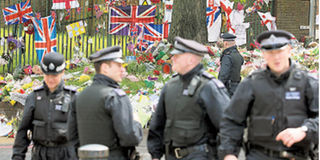London murder brings out the worst and best in British society

Police officers stand beside floral tributes at the scene of the murder of British soldier Lee Rigby of the 2nd Battalion the Royal Regiment of Fusiliers outside Woolwich Barracks, southeast London, on June 1. PHOTO | AFP
What you need to know:
- Drive-by shootings and school massacres that every so often blight American cities have not traditionally worried the British
The recent cold-blooded murder of a British soldier on a London street gave the world some fascinating, yet contradictory, insights into the state of the kingdom today.
The perpetrators of this heinous crime now await their fate, which in this country tends to be a few dozen years and you’re out halfway through with good behaviour.
It is only here that a Home Secretary would propose that the murder of a police officer should mean a “real” life sentence, while the murder of anyone else is often treated as a temporary incarceration, even though it is called a “life sentence”.
I digress; the Woolwich case has led to a lot of soul-searching across the country. How could something so utterly despicable happen on the streets of a city which easily takes pride of place as a citadel of everything from world culture to global finance?
London is the ultimate cultural melting-pot. It is said there are more languages spoken here than in any other city in the world.
Wherever your town or village is to be found – in Africa, Asia, Europe and the Americas – you’re sure to find some of “your people” in some corner of London, keeping the mother tongue alive.
Drive-by shootings and school massacres that every so often blight American cities have not traditionally worried the British.
That is not to say the country is immune from horrific attacks on the weak and vulnerable.
But the worry remains, like a pot simmering on the back-burner, that all’s not well on these isles. The continuing threat of violence by individuals who seek refuge in religion is never too far away.
While everyone else engaged in the voyeuristic act of watching and filming, two brave women tended to the fallen man at great risk to themselves, and one went even further to engage the attackers in a bid to prevent further violence.
Sixty-odd people stood around watching, recording the unfolding drama, careful to keep a safe distance, happy to play the observer, but impotent to intervene.
But kindness is not a condition that can be legislated into existence, especially where people live in fear of blame and retribution, or as in the Woolwich case, where you are confronted by an armed aggressor.
In the UK, we have become accustomed to hearing about “radicalised” youths who appear to have links with the Middle East or Pakistan. In the case of the Woolwich murder, we have individuals of African descent, who appear to speak like any other Londoner.
On the surface, they appear to be part of the multi-faceted mosaic of modern British society, in this case, with a tinge of Africa. That has raised more than a few eyebrows.
One associates Africans with struggle and hard work. Like many other immigrants seeking a better life in the diaspora, Africans will confirm that living in Europe and North America is not exactly a bed of roses.
Perhaps more than any other community, they have always had to struggle against the odds just to be accepted in Western society at a time when the right-wing is gradually winning the hearts of minds of the locals, from Greece to France and even the UK, and persuading them that the economic problems that currently bedevil the continent are caused by immigrants.
Some will ask, what got into the heads of a couple of young men who should have been trying to honour their folks by integrating into society and making a better life for themselves?
On closer inspection, however, it becomes apparent that the level of disenfranchisement in society, which culminated in the looting and torching of properties in the summer of 2011, combined with the power of religious intolerance, can easily sow the seeds of a misplaced sense of martyrdom.
However, British society has this incredible capacity to spring back to life in the face of calamity, for while the streets are not exactly paved in gold, the two ladies who tended the fallen soldier amply demonstrated that the streets are not lacking in the milk of human kindness either.
Prof Kamoche is the director of the Africa Research Group at Nottingham University




